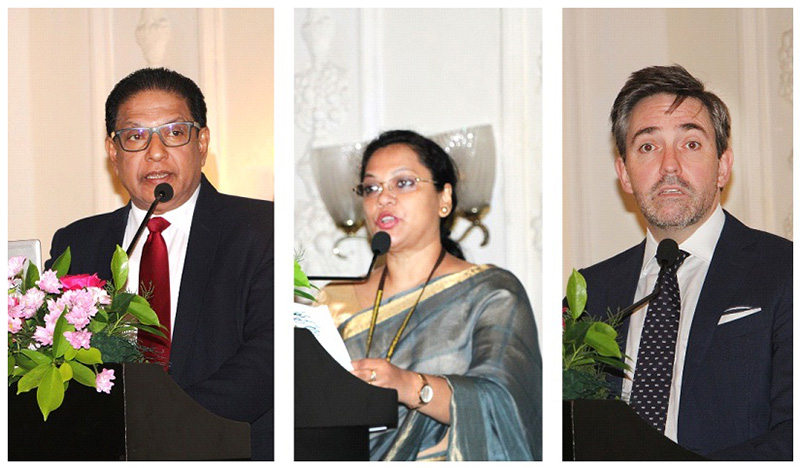Business
Sustainable Development Council steps up efforts towards integrated SDG monitoring in Sri Lanka

The Sustainable Development Council (SDC) in partnership with the United Nations Economic and Social Commission for Asia and the Pacific (ESCAP) conducted a two-day workshop for key government agencies on integrated monitoring of the Sustainable Development Goals (SDGs) in Sri Lanka on 08th and 09th May in Colombo.
In order to address a critical gap highlighted in Sri Lanka/s Second Voluntary National Review (VNR) on SDG implementation in 2022, relating to monitoring and evaluation of Sri Lanka’s progress on SDGs, the SDC developed the National SDG Progress Dashboard as a first step towards comprehensive SDG progress monitoring and evaluation in Sri Lanka following a whole-of-government approach. The National SDG Progress Dashboard developed with technical support from ESCAP provides a snapshot of Sri Lanka’s progress towards achieving nationally recognized SDG targets.
The objectives of the two-day workshop held last week were to further enhance the use of data for effective monitoring of SDG implementation in Sri Lanka, including achieving increased ownership of the SDG national targets by the line ministries, and work towards an integrated approach in monitoring and evaluation of Sri Lanka’s SDG progress.
In welcoming the participants, Director General of SDC, Chamindry Saparamadu, highlighted that as the time to achieve the SDGs is running out, government institutions should focus on how accountability for the implementation of SDGs can be improved through robust monitoring and evaluation of SDG achievements.
Speaking during the Opening Session of the two-day workshop, the UN Resident Coordinator for Sri Lanka, Marc- Andre Franche, emphasized that, monitoring progress towards the SDGs is a crucial part of the 2030 Agenda and the national SDG targets identified and validated by all line ministries will form the basis for future development planning.
Delivering the Key Note Remarks, Secretary to the Prime Minister, Anura Dissanayake observed that without timely statistics, including different levels of disaggregation, it is difficult to delve deeper into multifaceted and complex development challenges that are facing the society today. Dissanayake emphasized the importance of strengthening data and monitoring frameworks to improve decision-making, transparency and accountability as well as efficiency in directing policy interventions and investments towards where the needs are.
The workshop delved into understanding the flow of SDG data at global and national levels, the key components of effective SDG data coordination, regional experiences using SDG data for effective monitoring, selection of national SDG indicators and approaches towards integrated monitoring and evaluation. The workshop also featured a panel discussion with Mahinda Gunarathna, Additional Secretary to the Prime Minister, Anuradha Kumarasiri, Director General, National Planning Department, Ms. Anoja Senevirathne, Director General, Department of Census and Statistics, D.D.Matharachchi, Additional Secretary (Planning and Development), Ministry of Urban Development & Housing. The workshop concluded with the formulation of an Action Plan to develop an integrated monitoring and evaluation framework for the SDGs in Sri Lanka.
The participants of the workshop included SDG data focal points and SDG focal points appointed by the line Ministries and government institutions and relevant officers from the Sustainable Development Council, the Department of Census and Statistics and the National Planning Department.
Business
Sri Lanka’s recovery: A boon for banks, a burden for many

As Sri Lanka’s economy charts a fragile path toward recovery in 2026, the latest corporate earnings data reveals a stark and widening divide. While households and most industries grapple with a slow and arduous healing process, the banking and financial sector is posting windfall profits – a dynamic deepening public concern that the financial system is benefiting disproportionately from an economy still causing widespread hardship.
The Purchasing Managers’ Index hints at tentative stabilisation, with slowing inflation offering some relief. Yet, as an independent analyst cautioned, “The road to recovery is long and full of potholes,” pointing to the enduring burdens of debt and challenging reforms.
“This slow, painful repair is reflected in an 11.9% year-on-year decline in cumulative corporate earnings, driven by sharp falls in the Food, Beverage and Tobacco and Capital Goods sectors. In stark contrast, the Banking and Diversified Financials sectors are not merely recovering; they are accelerating. The Banking sector’s earnings grew by a robust 38.9%, powered by loan book expansion and improved asset quality, with giants like Commercial Bank and Hatton National Bank leading the pack. Similarly, the Diversified Financials sector exploded with 112.6% growth, fueled by a lower interest rate environment and significant fair-value gains in the equity market,” he said.
“This dramatic outperformance underscores a persistent and contentious reality. The financial sector’s role as the economy’s essential intermediary appears to insulate it – and enable it to profit – amidst broader volatility. Its foundational strength is solidifying even as other sectors and the public at large still face grave difficulties,” he said.
“In this context, a growing strand of public opinion questions why the dividends of this pronounced financial resilience are not felt more broadly. The perception is clear: the hardships on the ground – the headwinds on the recovery road – are conspicuously absent from the banking bottom line. Instead, the sector emerges, yet again, as the unambiguous winner in an uneven landscape, leading many to ask when and how this financial success will translate into more tangible, shared gains for the nation at large,” he questioned.
“All in all, the data confirms the banking sector’s fortified foundation. Yet, its social license for such substantial profits may increasingly depend on demonstrating a clearer contribution to a more inclusive and equitable recovery for all Sri Lankans,” he warned.
By Sanath Nanayakkare ✍️
Business
Beyond blame: The systemic crisis in Sri Lanka’s medicine regulation

The recent suspension of ten Indian-manufactured injections by Sri Lanka’s medicines regulator has done more than ignite a fresh “substandard medicines” scare. It has laid bare a chronic, systemic failure in the nation’s pharmaceutical governance – a failure that transcends political parties and individual ministers.
According to Ravi Kumudesh, President of the Academy of Health Professionals (AHP), this episode is not an isolated scandal but the latest symptom of a regulatory regime that operates on personality and discretion rather than transparent, evidence-based science.
The public’s current anxiety, Kumudesh argues, stems from a dangerous confluence: an allegation of microbial contamination in an injectable, the blanket suspension of ten products from one manufacturer, and the opaque controversy surrounding an “Indian Pharmacopoeia” agreement. “When these three collide,” he states, “the outcome is predictable: not clarity, not confidence – but a national regulatory regime that the public is asked to ‘trust’ without being given the evidence required to trust.”
A problem rooted in system, not scapegoats
Kumudesh insists that framing this crisis around former Health Minister Keheliya Rambukwella or the current minister, Dr. Nalinda Jayatissa, misses the fundamental point. The core issue is a system that has remained stubbornly unchanged across administrations. “The public has watched governments change while the internal decision-making circle inside the regulatory system appears to remain remarkably stable,” he observes. This creates a perilous pattern where the same insiders sometimes act as public critics and at other times as ‘story managers’ within the system, leading to public perception of a credibility gap that no mere statement can bridge.
From hospital test to national edict: A question of protocol
The central controversy, Kumudesh explains, is not the precautionary suspension itself but the evidence pathway that led to it. “A hospital laboratory can detect signals. But national regulatory action requires national-level validation,” he emphasises. The critical, uncomfortable questions he raises are: If Sri Lanka’s own national medicine quality laboratory still lacks full public confidence, how can a hospital test justify a nationally consequential suspension? And if subsequent international or confirmatory tests contradict the initial finding, who repairs the shattered trust and clinical disruption?
He warns that Sri Lanka has seen this movie before – products removed amid public alarm only to be reintroduced later, creating clinical chaos and eroding faith. “Regulatory panic creates clinical chaos,” Kumudesh notes. The proper response to a contamination allegation, he outlines, is systematic: isolate temporarily, collect samples under strict chain-of-custody, and verify through recognised reference testing – not “suspend and shout.”
The unanswered questions: Procurement and agreements
Kumudesh points to glaring gaps in public accountability. One key question remains unanswered: were pre-shipment test reports for these injections reviewed? “If yes: where are the reports? If no: how did the system allow high-risk products in?” he asks, stressing that procurement is a patient-safety responsibility, not mere paperwork.
Furthermore, the shadow over the reported “Indian Pharmacopoeia” agreement exemplifies the systemic opacity. “If an agreement exists, the first duty is public disclosure,” he asserts. Without it, the public cannot assess whether Sri Lanka is strengthening its standards or inadvertently weakening its own scrutiny and liability pathways.
The path forward: Evidence over emotion
For Kumudesh, the solution lies in a radical shift from personality-based to evidence-based regulation. “Committees do not fix systems – systems fix systems,” he says, critiquing the cyclical political response of appointing committees after each crisis. His prescription is structural:
= Establish a stable, transparent regulatory protocol immune to political or personal influence.
= Build a credible, independent national medicine quality laboratory with recognised competency.
= Enforce a clear, legally sound evidence pathway for all regulatory decisions.
= Ensure routine publication of key regulatory outcomes and decisions.
“Without a credible national laboratory,” he warns, “Sri Lanka remains permanently dependent on foreign timelines and credibility, while its own decisions are perpetually questioned.”
The ultimate question Kumudesh leaves for policymakers and the public is stark: “Is the fear of substandard medicines being used to protect patients – or to hide the system’s inability to prove the truth quickly, transparently, and credibly?” Until the architecture of regulation is rebuilt on the bedrock of science and transparency, he concludes, this crisis will not be the last. It will simply be the latest in a long line of failures that place patients and professionals in the crossfire of a system they cannot trust.
By Sanath Nanayakkare ✍️
Business
Venezuela’s oil reserves : Investments hinge on politics

Venezuela has more oil than any other country, but it pumps very little of it. Its national oil company is broke, so the country now needs private investment to fix its broken industry. This could let big American oil companies like Chevron return.
For these companies, the advantage is huge oil fields and facilities that could be repaired fairly quickly. But their investment depends entirely on politics and getting a good deal. As one expert put it, “It’s about the politics.”
For everyday gas prices, not much will change right away. Venezuela currently produces so little that it won’t affect the global market much. The U.S. is also producing record amounts of its own oil and has large emergency stockpiles, which help keep prices stable.
In short, American companies see a major opportunity in Venezuela’s vast oil, but they are facing major political risks. The story isn’t about a lack of oil in the ground; it’s about whether the politics will ever be stable enough to safely get it out.
By Sanath Nanayakkare ✍️
-

 News3 days ago
News3 days agoHealth Minister sends letter of demand for one billion rupees in damages
-

 Features7 days ago
Features7 days agoIt’s all over for Maxi Rozairo
-

 News6 days ago
News6 days agoLeading the Nation’s Connectivity Recovery Amid Unprecedented Challenges
-

 News12 hours ago
News12 hours agoPrivate airline crew member nabbed with contraband gold
-

 Opinion5 days ago
Opinion5 days agoRemembering Douglas Devananda on New Year’s Day 2026
-

 News7 days ago
News7 days agoDr. Bellana: “I was removed as NHSL Deputy Director for exposing Rs. 900 mn fraud”
-

 News6 days ago
News6 days agoDons on warpath over alleged undue interference in university governance
-

 Features7 days ago
Features7 days agoRebuilding Sri Lanka Through Inclusive Governance













